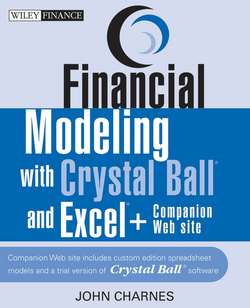Описание книги
Praise for Financial Modeling with Crystal Ball(r) and Excel(r) «Professor Charnes's book drives clarity into applied Monte Carlo analysis using examples and tools relevant to real-world finance. The book will prove useful for analysts of all levels and as a supplement to academic courses in multiple disciplines.» -Mark Odermann, Senior Financial Analyst, Microsoft «Think you really know financial modeling? This is a must-have for power Excel users. Professor Charnes shows how to make more realistic models that result in fewer surprises. Every analyst needs this credibility booster.» -James Franklin, CEO, Decisioneering, Inc. «This book packs a first-year MBA's worth of financial and business modeling education into a few dozen easy-to-understand examples. Crystal Ball software does the housekeeping, so readers can concentrate on the business decision. A careful reader who works the examples on a computer will master the best general-purpose technology available for working with uncertainty.» -Aaron Brown, Executive Director, Morgan Stanley, author of The Poker Face of Wall Street «Using Crystal Ball and Excel, John Charnes takes you step by step, demonstrating a conceptual framework that turns static Excel data and financial models into true risk models. I am astonished by the clarity of the text and the hands-on, step-by-step examples using Crystal Ball and Excel; Professor Charnes is a masterful teacher, and this is an absolute gem of a book for the new generation of analyst.» -Brian Watt, Chief Operating Officer, GECC, Inc. «Financial Modeling with Crystal Ball and Excel is a comprehensive, well-written guide to one of the most useful analysis tools available to professional risk managers and quantitative analysts. This is a must-have book for anyone using Crystal Ball, and anyone wanting an overview of basic risk management concepts.» -Paul Dietz, Manager, Quantitative Analysis, Westar Energy «John Charnes presents an insightful exploration of techniques for analysis and understanding of risk and uncertainty in business cases. By application of real options theory and Monte Carlo simulation to planning, doors are opened to analysis of what used to be impossible, such as modeling the value today of future project choices.» -Bruce Wallace, Nortel
